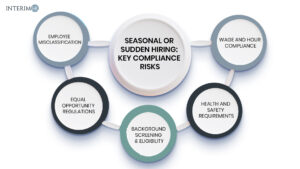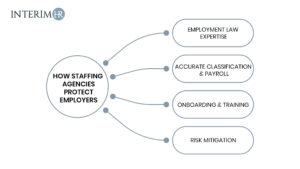When organizations experience a sudden increase in hiring—whether due to seasonal peaks, business expansion, or unexpected market demands—they often face a wave of compliance challenges. From ensuring fair hiring practices to managing payroll, taxes, and employee classification, HR compliance becomes a critical concern. In fact, the Society for Human Resource Management (SHRM) reports that non-compliance with employment law can result in fines exceeding $50,000 per violation, not to mention reputational damage.
Partnering with a temp staffing agency or interim staffing provider plays a vital role in reducing these risks. By leveraging their expertise in employment law, contingent staffing, and workforce management solutions, staffing firms help businesses stay agile during hiring surges while avoiding costly mistakes.
In this guide, we’ll explore the compliance risks of sudden hiring, how staffing agencies protect employers, the policies that should govern temporary hiring, and best practices in documentation and reporting.
Seasonal or Sudden Hiring: Key Compliance Risks in Employment Law & HR Compliance
Hiring surges are common across industries—retailers ramp up for the holidays, healthcare facilities prepare for flu season, and logistics companies scale operations during peak shipping periods. However, these surges expose organizations to compliance risks, including:

- Employee Misclassification
Mislabeling workers as independent contractors instead of employees can lead to IRS penalties and labor law violations. This is where HR staffing services and direct hire staffing services ensure proper classification. - Wage and Hour Compliance
Employers must ensure adherence to federal and state wage laws, including overtime rules, which often become complex with large temporary workforces. Corporate payroll services and payrolling services offered by staffing firms help mitigate this risk. - Equal Opportunity Regulations
A surge in hiring increases exposure to discrimination claims if hiring practices are not carefully documented and standardized. Having clear HR policies helps minimize legal challenges. - Health and Safety Requirements
Bringing in temporary workers without adequate safety training can result in OSHA violations and increased liability. A staffing partner ensures onsite staffing management and workplace training. - Background Screening & Eligibility
During high-volume recruiting, shortcuts in background checks or I-9 verification can trigger non-compliance fines. Executive placement firms and executive recruiters provide structured, compliant hiring processes.
Without proper oversight, hiring surges can quickly turn from growth opportunities into legal liabilities.
How Staffing Agencies, Interim Staffing, and Workforce Management Solutions Protect Employers
Staffing firms are more than just recruiters—they are compliance partners. Their role in supporting HR compliance during surges includes:

- Employment Law Expertise
Agencies remain up to date on federal, state, and local employment law regulations, ensuring clients follow all relevant laws. - Accurate Classification & Payroll
Staffing firms manage worker classification, overtime compliance, and payrolling services. This reduces employer liability and ensures workers are compensated correctly. - Onboarding & Training
Agencies streamline onboarding with legally compliant documentation and can provide mandatory workplace training for temporary staff. - Risk Mitigation
Staffing partners absorb certain risks, such as workers’ compensation claims, unemployment insurance, and liability coverage, shielding businesses from potential lawsuits. Many also integrate vendor management systems (VMS solutions) and managed service provider staffing for smoother compliance.
By outsourcing compliance-sensitive tasks, employers can focus on productivity while trusting that regulatory obligations are being met.
Essential HR Policies for Temporary, Project-Based, and Contingent Staffing
To avoid compliance pitfalls, businesses engaging in seasonal or contingent staffing should adopt clear HR policies. Some essentials include:
- Equal Employment Opportunity (EEO) Policy
A documented EEO policy ensures that every applicant is treated fairly, reducing exposure to discrimination claims. - Wage & Hour Policy
Clarifies overtime rules, breaks, and compensation structures, which are especially important for hourly and temp-to-hire staffing employees. - Workplace Safety Policy
Defines health and safety responsibilities for both full-time and temporary staff, ensuring OSHA compliance. - Data Privacy Policy
Protects sensitive employee information such as Social Security numbers and payroll data, especially when third-party vendors are involved. - Anti-Harassment Policy
Ensures a safe workplace environment for all employees, regardless of their length of engagement.

Staffing agencies can guide employers in creating, refining, and enforcing these policies across permanent staffing and temporary teams.
Best Practices in Documentation, Payroll Services & Reporting Compliance
Strong documentation is the foundation of HR compliance. During hiring surges, organizations should adopt best practices such as:
- Centralized Recordkeeping
Maintain consistent files for all temporary employees, including applications, contracts, I-9s, and performance records. - Audit-Ready Payroll Records
Ensure time tracking and corporate payroll services are synchronized to reduce errors and maintain compliance with wage laws. - Standardized Onboarding Checklists
A checklist-driven process ensures that every worker completes necessary legal forms before starting work. - Regular Compliance Audits
Partner with staffing agencies to conduct periodic audits of employment practices and payroll systems to identify risks before they escalate. Many agencies also offer RPO solutions and recruitment process outsourcing for scalable compliance oversight.
By implementing structured documentation and transparent reporting, companies not only maintain compliance but also strengthen trust with employees and regulators.
Conclusion: Turning Staffing Risk Management and HR Compliance into Competitive Advantage
Hiring surges present both opportunities and risks. While rapid growth can help organizations capture market share, failing to manage HR compliance can lead to costly penalties and long-term reputational harm.
Staffing firms bridge this gap by combining workforce agility with regulatory expertise, ensuring businesses stay compliant even under pressure. For HR leaders, partnering with the right temp staffing agency transforms compliance from a burden into a strategic advantage.
For HR leaders, partnering with the right staffing agency transforms compliance from a burden into a strategic advantage. Not only does it minimize risk, but it also builds a foundation of trust with employees, regulators, and clients.
Looking for a staffing partner to navigate compliance during your next hiring surge? Discover tailored solutions with Interim HR Consulting.
FAQs on HR Compliance, Temp Staffing Agencies, and Employment Law
Q1: What compliance issues arise in sudden hiring?
Compliance risks include misclassifying employees, wage and hour violations, inadequate background checks, discrimination claims, and lapses in workplace safety training. These risks increase when large numbers of workers are hired in short timeframes.
Q2: How can temp staffing mitigate risk?
Temp staffing agencies reduce risk by managing worker classification, payroll, onboarding, and training. They ensure compliance with employment laws, handle documentation, and absorb certain liabilities, making them valuable partners for employers during hiring surges.
